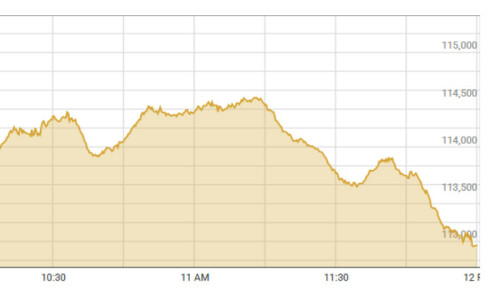PARIS: Once impenetrable, the individual genetic code is becoming an open book, thanks to kits that scan for genes linked to scores of traits and diseases, from cancer and baldness to infertility and memory loss.
A couple of hundred dollars, a few drops of saliva and a stamped envelope is all it takes to get a rundown on your inherited risk of around a hundred more-or-less common conditions. You can place your order by Internet.
Business is booming even as some experts raise red flags about the tests, challenging their accuracy and questioning the wisdom of satisfying the growing hunger for intimate genetic knowledge.
Leading the pack of start-ups is California-based 23andMe, which offers “to help others take a bold, informed step toward self-knowledge”.
Rival deCODEme, a subsidiary of Iceland firm deCODE, promises “the discovery of your genetic propensity for developing specific diseases and conditions”.
Navigenics in Redwood Shores, California says it can “help you live healthier, longer”.
The business is called personalised genomics, and it is only now starting to deliver on a long-heralded promise.
Within a decade, say its supporters, mapping one’s complete genetic landscape will be as quick and common as a blood test for cholesterol.
Already today, women can check for a faulty variant of two genes, BRCA 1 or 2, that boosts the chance of getting breast cancer by 50-80 per cent.
Other tests scan for the likelihood of sexual dysfunction brought on by certain anti-depressants, or heightened odds of becoming obese, schizophrenic or diabetic.
Parents can scan for diseases in their children – even when they are barely-fertilised embryos.
Last week saw the birth of the first baby in Britain grown from an embryo screened to ensure it did not contain the same breast cancer-causing gene inherited by her mother.
Another test is designed to spot athletic potential, and help figure out if junior could be the next Usain Bolt or just an also-ran.
The kit, marketed in the US by Atlas Sports Genetics, checks for either of two variants of the ACTN3 gene.
One gives rise to so-called “fast-twitch muscles” common among world-class sprinters, while the other produces the slow-twitch version found among endurance athletes.
Not all the genetic secrets waiting to be unlocked are critical – or even secret.
A sweet tooth, wet ear wax, heightened sensitivity to bitter greens or a slightly porous memory are hardly life-altering discoveries.
Why now? The science behind gene testing is not new. What has changed, and rapidly, is the cost of technology.
Since the three-billion-dollar Human Genome Project was completed in 2001, sequencing an individual’s genome “has become an order of magnitude cheaper and faster” every couple of years, Lynda Chin, a researcher at the Dana-Farber Cancer Institute in Boston, said in an interview.
The price tag today is about 100,000 dollars, and at least one company, Pacific Biosciences in Menlo Park, California, says it will be able, by 2013, to map all three billion base-pairs of a person’s DNA in a quarter of an hour for a few hundred dollars.But not everyone is ecstatic.
To start with, the tests available to date are only snap shots of a DNA snippet, not the whole shebang. More critically, the data they yield is subject to interpretation.
“All of these tests carry a high degree of uncertainty,” said Arnold Munnich, a researcher at the Centre for Genetic Medicine at Necker Hospital in Paris.
French genetics expert Segolene Ayme says “many of the kits currently on offer are simply scams”.
Most diseases or conditions are caused by a complex web of genetic and environmental factors that are hard to tease apart, these scientists explain.
Only a handful – so-called Mendelian diseases, such as muscular dystrophy and cystic fibrosis – are caused by mutations in a single gene.
By contrast, nearly 20 genes have been linked in studies to Type 2 diabetes, and at least as many can play a role in different forms of cancer.
More are likely to be added.
So even if the tests in question are accurate, the real problem is how to interpret the data they yield.
There is another danger: if it falls into the wrong hands, the same data that might lead to early diagnosis or targeted treatment of a disease could become a reason to refuse employment, insurance or a bank loan.
Last year US President George W. Bush signed the Genetic Information Nondiscrimination Act to outlaw such abuses, but enforcement remains a concern.
Other countries have yet to follow suit.
Finally, the most vexing question may be this: do we really want to know everything that our genome has to say? That we have a 20 per cent greater chance of falling into dementia by the time we are 70, or that we are prone to alcohol or drug abuse?
“I have chosen not to learn whether I have a gene that increases the risk of Alzheimer’s disease,” Steven Pinker, a professor at Harvard University and a leading proponent of evolutionary psychology, wrote recently in The New York Times.
Pinker is among the first 10 individuals whose genomes are to be sequenced and posted on the Internet as part of the Personal Genome Project, a public database for researchers that aims to compile complete genetic profiles of 100,000 people.
“Personal genomics is here to stay,” argues Pinker. “People who have grown up with the democratisation of information will not tolerate paternalistic regulations that keep them from their own genomes.”—AFP














































Dear visitor, the comments section is undergoing an overhaul and will return soon.